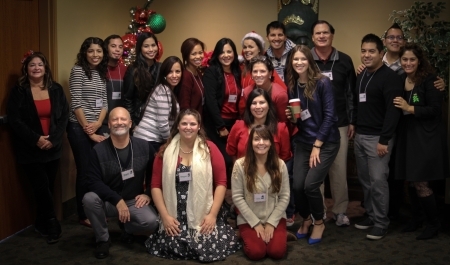University of California San Diego
The UCSD Mother Child Adolescent Program was founded in 1989. Our office has 41 staff members. We aspire to improve the care and treatment of HIV-infected and affected women, children, and youth in an effort to prevent new HIV infections through research, clinical care, and education.
Clinic Location
Our site is centrally located and accessible to public transportation; it is also adjacent to our medical facilities. We strive to create a place where families enjoy coming in to the building.
Our Staff
As the Program Director and HIV Specialist, Dr. Stephen Spector has overseen the program and has improved quality of clinical care for the families at our site since the very beginning. He is an advocate for our families and continues to help them through his scientific research.
Dr. Viani is an infectious disease and HIV specialist and has 23 years of experience in pediatric infectious diseases and HIV medicine. He cares for HIV positive patients and investigates their health internationally. His efforts are greatly motivated by the families he works with.

Lisa Stangl, CPNP is our nurse practitioner, providing health assessments and guidance to families volunteering in research studies.
Mary Caffery, RN, MSN is the nurse coordinator at our site and helps plan and lead the FAB. She is responsible for enrolling SMARTT dynamic patients.
Kim Norris, RN, BSN is our research coordinator who has been dedicated to providing outstanding administrative leadership for our research activities for eight years.
Anita Darcey, RN, BSN is a dedicated pediatric and research nurse. Anita provides holistic family-centered care, with the goal of optimizing the health & well-being of her patients & their families.
Sharon Nichols, PhD is a neuropsychologist and investigator in the Pediatric HIV/AIDS Cohort study. She does developmental and cognitive evaluation and leads a study on the contribution of memory and other cognitive factors to medication adherence and other aspects of daily functioning in children and youth with HIV.
Veronica Figueroa, MA administers neuropsychological assessments in English and Spanish. Currently, she serves as the liaison to the UCSD Mother, Child, Adolescent HIV Program Family Advisory Board and the PHACS Young Adult Community Advisory Board. She works with the community to share concerns about research with the research team and teaches the community about research.
Megan Loughran, BA is the Regulatory Coordinator for our studies and ensures that our research is in compliance with all human subjects regulations and that the research is completed in an ethical and responsible manner.
Myrene Preston, RMA is the Quality Manager and has been with program for 25 years. She evaluates study documents and assists staff with changes to improve data collection.
Betty Pritchard has been our Data Manager for over 15 years, and is responsible for maintaining data and resolving issues related to our data analysis queries.
Roanne Domingo is the laboratory manager who is responsible for lab sample collections and specimen preparations. She just celebrated her first year with the program.
Our CAB
We call our Community Advisory Board (CAB) FAB for Family Advisory Board. One word to describe our FAB would be exceptional. What makes our FAB strong is that the attendees are great communicators and share their own experiences. They request workshops on interesting topics, show appreciation for one another, and act as consultants to help us improve our program and the research we do. Our FAB feels more like a community because we have dinner together before we get started so people have a chance to socialize before we get to work.
What are some words you would use to describe your staff?
We are skilled, culturally diverse, bilingual, responsible, understanding, and dedicated.
What tip can your site share on how to make a study visit run smoothly?

The best tips we have on how to make a study visit run smoothly is to be respectful of participants, organized, and prepared. Our staff members utilize a huddle to pre-plan the visit and, when possible, schedule patients at least a week ahead of time to allow us to review that everything is ready for the visit including transportation. We designate one staff member to coordinate and communicate the flow of the visit. We try to limit the amount of waiting time a family has, and keep them occupied when they do have to wait. We review any ways we could improve the visit afterward.
How does your research team make study visits comfortable for families?
We try to provide a supportive and welcoming environment to keep our volunteers comfortable. From the minute people walk in the door they are greeted by a warm, caring and bilingual front desk staff. Social workers at our site personally reach out to families throughout the year. We make snacks available in case the participants get hungry. Our office has a small video and book library, a dollhouse, toys, and a computer participants can use. Many of the families we work with have busy schedules or are concerned about their children missing school so we sometimes see families on the weekends.
Please share a valuable contribution a participant has made to improve your site.
One of our participants let us know that we could reduce anxiety for some children by allowing additional time for adjustment before blood draws. This idea has resulted in children feeling calmer before lab work.
What are some special events your clinic has held in the past?
We proudly celebrated our 25th anniversary in 2014. Each year, we participate in the San Diego AIDS Walk. Our program also hosts an annual holiday party for the families we work with so we will begin planning that celebration soon too. Our FAB members have attended research conferences in the past years: The PHACS Network Meeting in Baltimore and The IMPAACT Meeting in San Juan. We hope to have representation at research conferences from our study volunteers each year.


